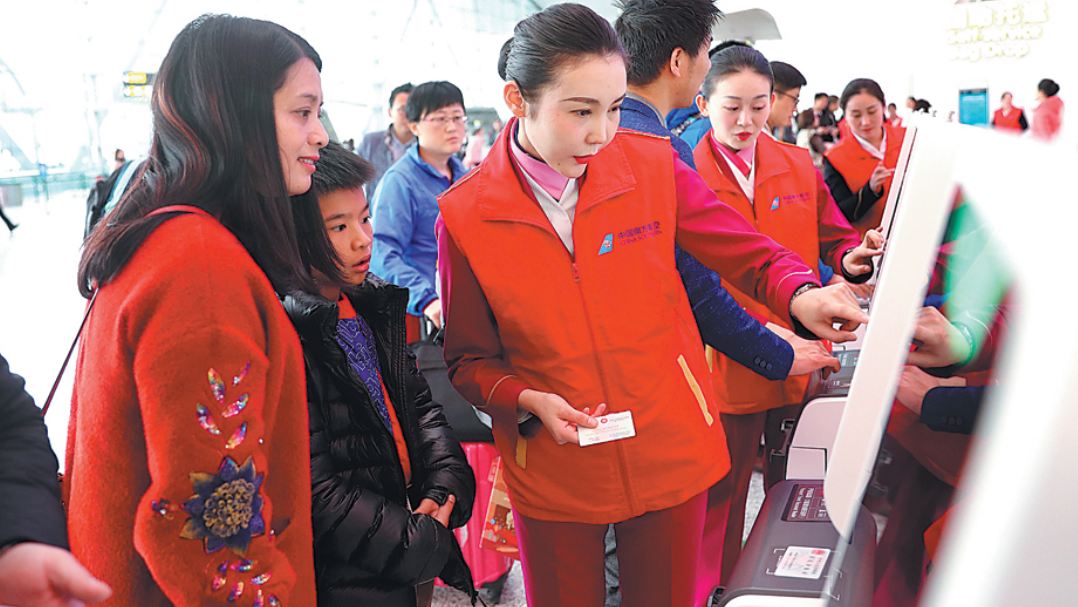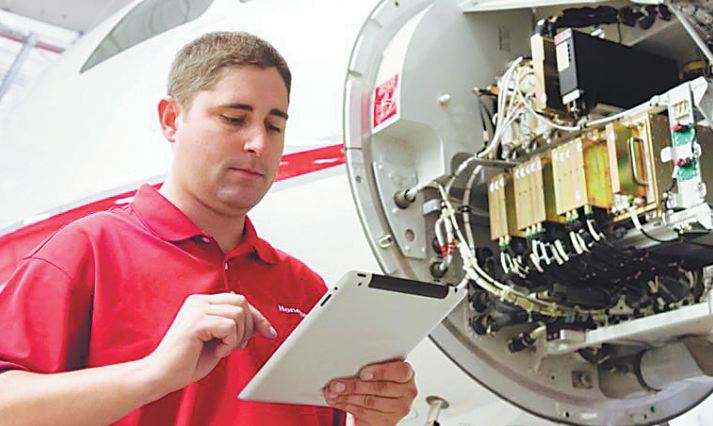Civil aviation sector embracing digital era
Xinhua | Updated: 2019-02-20 08:25

Digitalization improving operational efficiency, upgrading services and reshaping industry development models
China's civil aviation industry is accelerating its advance into the digital era.
Already this year, China Southern Airlines has started online seat selection services for all domestic flights, as well as paperless e-boarding passes. As well as offering more convenience for passengers, the move is also a response to environmentally friendly travel initiatives.
In the first week after the services were offered, about 75 percent of passengers on its domestic routes opted to select their seats via digital devices, said China Southern.
Based in Guangzhou, Guangdong province, China Southern operates the largest fleet in Asia and the third-largest worldwide. In 2018, it recorded 139 million passenger journeys.
China Southern e-Travel, its mobile app, is part of the airline's digital strategy, which combines mobile internet functionality with all its services, consolidating resources for air travel and tourism, and offering one-stop shopping and door-to-door services for customers.
Cathay Pacific and Cathay Dragon have also had paperless services on their 15 daily flights between Shanghai and Hong Kong since Oct 29, 2018. Passengers can enjoy easier and more flexible digital services including booking, paying, check-in and boarding.
"The global aviation industry is at a crucial point. It is transitioning from an increment-driven market to one in which greater value and opportunities are being extracted from the existing market. And digitalization presents a crucial opportunity for China," said Yu Zhanfu, partner and vice-president for China at consultancy Roland Berger.
Rising cost pressures and safety concerns are affecting the aviation industry worldwide. Digitalization is seen as key to improving operational efficiency, upgrading services, and reshaping development models, Yu said.
"It is widely recognized that digitalization is a new value-growth point. Alongside dramatic growth in China's civil aviation sector, the authorities, domestic aviation manufacturers and technological giants are all eyeing digitalization," said Xu Jun, vice-president of Asia-Pacific original equipment manufacturers at Honeywell Aerospace.
In January 2018, the Civil Aviation Administration of China issued its assessment guidelines on personal electronic devices. It was seen as an impetus to reshape the cabin experience with in-flight internet.
Since then, domestic airlines have been relaxing their restrictions on in-flight mobile device usage and major domestic aviation manufacturers have been embracing the digital era.
At the 2018 China Airshow, Hainan Airlines announced a partnership with Honeywell that would see Honeywell's supply auxiliary power units and aftermarket support to the airline's fleet, including its GoDirect connected maintenance services, a predictive technology based primarily on data.
The aviation industry has an extremely long value chain covering research, development, operation and maintenance, each of which has significant added value and constantly generates enormous amounts of data, according to Xu.
Digitalization is inevitable for aircraft manufacturers and systems vendors, Xu said. In the design phase, digital systems and methods are increasingly applied, significantly enhancing the efficiency of design, research, development and testing while reducing costs.

Airlines are using digital technologies to improve operating efficiency and safety. The results are smarter and safer aircraft, better flight experiences and lower operating costs.
"Digitalization opens a new horizon with regard to safety, efficiency and cost for both aircraft manufacturing and civil aviation sectors," Xu said.
For example, airlines can lower maintenance costs by predicting the health of aircraft equipment using big data, while passengers enjoy communications and entertainment in "connected aircraft".
With internet-based predictive maintenance technology, auxiliary power unit maintenance and malfunction data is downloaded from existing data on the aircraft. It allows for the prediction of imminent hardware malfunctions or other potential problems with a high degree of precision.
The data is then relayed to maintenance crews in an intuitive and visual manner, helping them tackle malfunctions before they occur. This allows for proactive and more efficient maintenance.
"An aircraft makes money for the airline only when it is flying, and revenue ceases as soon as it lands," Yu said.
If technicians can sense the aircraft's "health" by using data generated by it and carry out predictive maintenance, "it's a safer and more profitable operation", Yu said.
In fact, technicians can monitor and assess the health of an airplane while it is in the air by analyzing real-time data and selecting the appropriate time to carry out maintenance, repairs or replacement of parts.
In November 2018, the Commercial Aircraft Corp of China and e-commerce giant Alibaba Group jointly launched the Wang Jian Large Aircraft Workshop, an initiative to explore the use of intelligent manufacturing technology in passenger aircraft. COMAC is the developer of China's C919 large passenger airplane.
The workshop is one of several collaborations between China's internet giants and commercial aircraft manufacturers to inject technologies like the internet, big data, cloud-computing and artificial intelligence into aviation manufacturing.
The International Civil Aviation Organization has forecast that China will be the world's largest civil aviation market by mid-2020.
In 2018, China's civil aviation industry hit a new record with more than 10 million flights. Passenger numbers were up 10.9 percent year-on-year to 610 million and cargo was up 4.6 percent to 7.385 million metric tons, according to the CAAC.
China's civil aviation authorities are pushing forward the integration of the civil aviation sector with new technologies such as facial recognition, automatic vending and luggage check-in, and intelligent inquiry services.
The CAAC is also encouraging the application of artificial intelligence and biological feature recognition technologies in its security operations, and promoting in-flight connectivity.
- Chinese company delivers 100th 777 empennage tip to Boeing
- Air travel fastest growing mode of transport during Spring Festival
- 4,000 passengers affected due to pilot strike in Taiwan
- Airlines show preference for female staff
- China becomes key dynamic force of global civil aviation: IATA director general
























